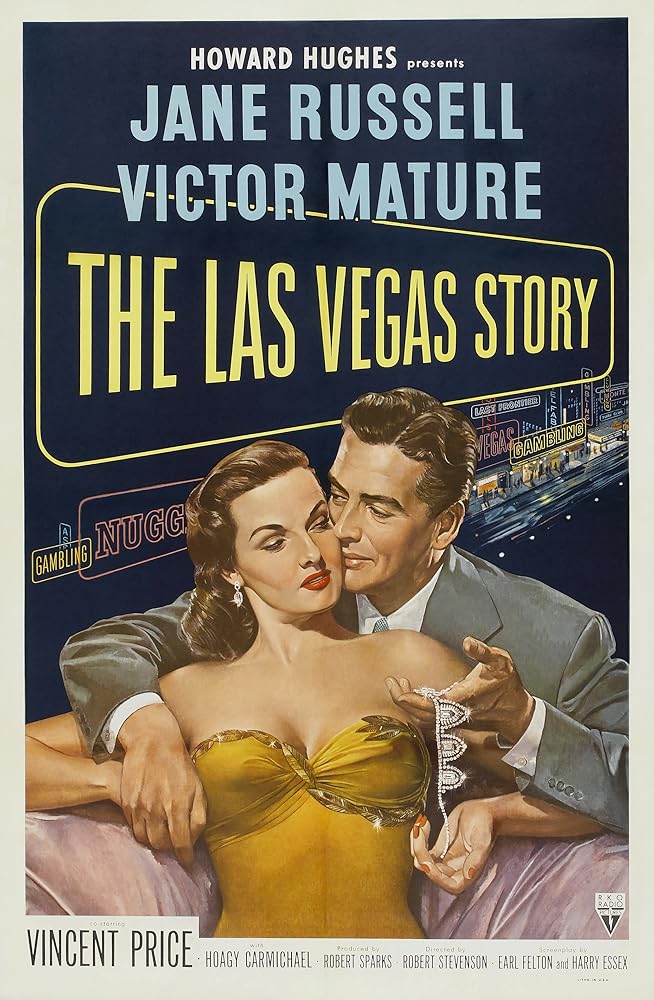
LAS VEGAS STORY, THE
(director: Robert Stevenson; screenwriters: Paul Jarrico/Earl Felton/Harry Essex/story by Jay Dratler; cinematographer: Harry J. Wild; editors: Frederic Knudtson/George C. Shrader; music: Leigh Harline; cast: Jane Russell (Linda Rollins), Victor Mature (Lt. Dave Andrews), Vincent Price (Lloyd Rollins), Hoagy Carmichael (Happy), Brad Dexter (Tom Hubler), Gordon Oliver (Mr. Drucker), Jay C. Flippen (Sheriff H. A. Harris), Will Wright (Mike Fogarty), Bill Welsh (Martin), Robert Wilke (Clayton), Colleen Miller (Mary), Chester Marshall (Bill); Runtime: 88; MPAA Rating: PG; producers: Robert Sparks/Howard Hughes; RKO; 1952)
“B-film gem.”
Reviewed by Dennis Schwartz
Robert Stevenson (“My Forbidden Past”) walks out a winner in this pulpish crime drama that he directed with panache. It’s mainly scripted by Paul Jarrico who received no screen credit because of his pro-communist sympathies that met with the disapproval of nutty right-wing RKO boss Howard Hughes, who decided to take on the powerful Screen Writers Guild. This prompted a civil suit by Jarrico, who later suffered from a blacklist by HUAC over his politics. Hughes lost $600,000 on this B-film gem, probably the best film he ever produced. The story was written by Jay Dratler as a means of glamorizing Las Vegas for Hughes, who later would invest heavily in some of the casinos.
Wealthy but despicable investment broker Lloyd Rollins (Vincent Price) leaves Boston by train with his sexy ex-singer wife Linda (Jane Russell) and heads for a vacation in Los Angeles but decides to stop off in Las Vegas for a few days of gambling. That was Linda’s old stomping grounds where she worked as a singer in the Last Chance casino and dumped her hunky policeman boyfriend Lt. Dave Andrews (Victor Mature) when he went into the service during their wartime fling. Though reluctant to return to the Strip, hubby insists. At the Fabulous casino Lloyd requests a $100,000 credit limit from casino manager Drucker and has Linda wear a valuable diamond necklace to showoff his status. Linda knows something is up when she reads a telegram from his business associate Monty requesting he return the money because the trustees are demanding it. Later a man named Thomas Hubler (Brad Dexter), who followed them from the train, identifies himself as an insurance investigator and tells the couple he’s been asked to follow Lloyd and make sure nothing happens to the necklace.
Meantime Linda meets a sour but still lovesick Dave again, and reunites with her Last Chance piano player Happy (Hoagy Carmichael) and Mike Fogarty (Will Wright), the casino’s former gentlemanly owner who now works for the nasty new owner Mr. Clayton (Robert Wilke).
Linda takes a call that Monty has committed suicide, but the cocky Lloyd acts unconcerned when it’s relayed to him. He’s only testy that the casino manager tells him that he’s been approved for only a $10,000 credit limit because his references didn’t check out and when he quickly loses that, is asked to vacate the premises. Lloyd takes his business to the Last Chance where the owner gives him $10,000 for the necklace even though it’s worth at least $150,000. Lloyd loses again his bank roll and Clayton refuses any advances, which leads to veiled threats by Lloyd. Later that night, with Linda and Dave holed up in his house, Clayton is found knifed to death with a lemon parer and the film brilliantly changes on the dime from illicit romance to an action-packed murder mystery with Lloyd, now identified as an embezzler, as the prime suspect.
The exciting climax has for the first time a car/helicopter chase sequence on film, as Dave comes to the rescue of Linda as she’s kidnapped in a car by the crazed killer. Dave does a James Bond-like fifty-foot leap from an abandoned airplane hangar in the desert trying to save Linda when she’s grounded, proving that he still carries a torch for her. It ends with a playful Happy and a divorce-minded Linda working together again and singing a duette with lyrics such as “Keep your distance, my resistance is low,” which might explain what this appealing oddball story was all about.
REVIEWED ON 6/23/2006 GRADE: A